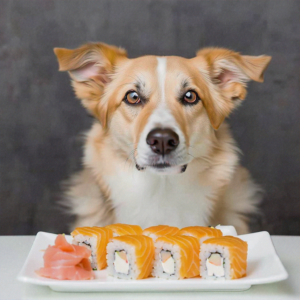Can Dogs Eat Sushi? 9 Important Dos and Don’ts for Dogs Eating Sushi
Sushi is a beloved delicacy worldwide, celebrated for its fresh ingredients, unique flavors, and exquisite presentation. However, as more pet owners look to share their culinary experiences with their furry friends, a crucial question arises: Can dogs eat sushi? While feeding sushi to dogs might seem appealing, it is essential to understand the potential benefits and risks involved.
Understanding Sushi: What Is It?

Before delving into whether can dogs eat sushi, it is vital to understand what sushi comprises. Sushi typically includes raw fish, rice, seaweed, vegetables, and various seasonings. Common types of sushi include:
Nigiri: Thin slices of raw fish elegantly placed on small beds of rice
Sashimi: Delicate slices of raw fish presented without rice
Maki: Rolls made with seaweed, rice, fish, and vegetables.
Temaki: Hand-rolled seaweed cones filled with rice, fish, and vegetables.
Each of these varieties contains different ingredients that can impact a dog’s health in various ways.
The Main Question: Can Dogs Eat Sushi?
The short answer can dogs eat sushi is that dogs can eat some types of sushi, but caution is necessary. Not all sushi ingredients are safe for dogs, and improper handling or preparation can pose serious health risks. Understanding the potential hazards and benefits can help pet owners make informed decisions.

Safe Sushi Ingredients for Dogs
Certain sushi ingredients can be safe and even beneficial for dogs when fed in moderation. These include:
1. Cooked Fish
While raw fish can harbor parasites and bacteria harmful to dogs, cooked fish can be a nutritious addition to their diet. Fish such as salmon, tuna, and whitefish are rich in omega-3 fatty acids, which promote healthy skin and coat.
2. Plain Rice
Plain white rice, often used in sushi, is safe for dogs and can help with digestive issues. It provides a good source of carbohydrates and can be a soothing food for dogs with an upset stomach.
3. Vegetables
Certain vegetables used in sushi, such as cucumbers and carrots, are safe for dogs. They provide essential vitamins and minerals and can be a healthy, crunchy treat.
Ingredients to Avoid When Dogs Eat Sushi
While some sushi ingredients are safe, others can be harmful or even toxic to dogs. Pet owners should avoid feeding their dogs sushi that contains the following:
1. Raw Fish
Raw fish pose a significant risk due to potential parasites and bacteria such as salmonella and listeria. These pathogens can cause severe gastrointestinal issues and infections in dogs.
2. Avocado
Avocado contains persin, a substance toxic to dogs. Even small amounts can lead to vomiting, diarrhea, and other serious health problems.
3. Wasabi and Spices
Spicy ingredients like wasabi, pickled ginger, and spicy mayo can cause gastrointestinal irritation in dogs. These ingredients can lead to vomiting, diarrhea, and abdominal pain.
4. Soy Sauce
Soy sauce is high in sodium, which can be harmful to dogs. Excessive sodium intake can lead to salt poisoning, causing symptoms such as vomiting, diarrhea, seizures, and even death.
5. Seaweed Salad
Seaweed salad often contains added salt and spices, which can be harmful to dogs. Additionally, some types of seaweed can cause digestive blockages.

Potential Risks of Dogs Eating Sushi
While some sushi ingredients are safe, feeding sushi to dogs comes with potential risks. Understanding these risks can help pet owners make informed decisions.
1. Parasitic Infections
Raw fish can carry parasites such as tapeworms and roundworms. These parasites can cause severe health issues, including gastrointestinal problems, weight loss, and malnutrition.
2. Bacterial Infections
Bacteria such as salmonella and listeria can be present in raw fish and other sushi ingredients. These bacteria can cause severe gastrointestinal symptoms and infections, requiring prompt veterinary care.
3. Toxic Ingredients
As mentioned earlier, ingredients like avocado, wasabi, and soy sauce can be toxic to dogs. Ingesting these ingredients can lead to serious health problems, including gastrointestinal irritation, poisoning, and organ damage.
4. Digestive Issues
The combination of unfamiliar ingredients, spices, and raw fish can cause digestive upset in dogs. Symptoms may include vomiting, diarrhea, and abdominal pain.
Benefits of Dogs Eating Sushi: Can Dogs Eat Sushi?
While there are risks, there can also be benefits when dogs eat sushi, provided it is prepared and served correctly.
1. Nutritional Value
Cooked fish, plain rice, and safe vegetables can provide essential nutrients. Fish is an excellent source of protein and omega-3 fatty acids, which support skin and coat health. Vegetables offer vitamins and minerals that contribute to overall well-being.
2. Variety in Diet
Offering a variety of foods can keep a dog’s diet interesting and enjoyable. Safe sushi ingredients can provide a tasty and nutritious treat that adds variety to their regular diet.
3. Bonding Experience
Sharing safe foods with dogs can strengthen the bond between pet owners and their furry companions. Feeding small, safe portions of sushi can be a special treat that enhances the relationship.
Sushi can be a delightful treat for humans, but it may not always agree with our canine companions. While some dogs may enjoy the occasional piece of plain, cooked fish, sushi can pose several risks. Here are signs that your dog may be having a bad reaction to sushi:
1. Vomiting
If your dog starts vomiting after consuming sushi, it’s a clear sign that something isn’t right. Vomiting can be a response to food poisoning, an allergic reaction, or an inability to digest certain ingredients commonly found in sushi, such as raw fish, rice, or seaweed.
2. Diarrhea
Diarrhea is another common symptom of a bad reaction to sushi. This can occur if your dog has ingested something that doesn’t agree with their digestive system. Prolonged diarrhea can lead to dehydration, so it’s important to monitor your dog closely.
3. Lethargy
If your usually energetic dog becomes suddenly lethargic or unusually tired, it could be a sign of food poisoning or an adverse reaction to something they ate. This lethargy could be due to the body’s efforts to fight off an infection or due to the digestive distress caused by the sushi.
4. Excessive Drooling
If your dog is drooling more than usual after eating sushi, it might be a reaction to a disagreeable ingredient or an indication of gastrointestinal upset.
5. Abdominal Pain
Signs of abdominal pain in dogs include whining, restlessness, and an unwillingness to lie down comfortably. Your dog may also exhibit a hunched posture or try to avoid being touched on their belly.
6. Allergic Reactions
Allergic reactions to sushi can manifest in several ways, including itching, swelling, hives, or difficulty breathing. If you notice any of these symptoms, seek veterinary care immediately as allergic reactions can be severe and require prompt treatment.
7. Loss of Appetite
If your dog shows a sudden lack of interest in food after consuming sushi, it might be a sign of gastrointestinal distress. Loss of appetite can also indicate that your dog is feeling unwell overall.
8. Changes in Behavior
Behavioral changes, such as increased irritability, restlessness, or unusual vocalizations, can indicate that your dog is uncomfortable or in pain. These changes might be subtle, so it’s important to pay close attention to your dog’s usual demeanor and any deviations from the norm.

What to Do If Your Dog Has a Bad Reaction to Sushi
- Remove Access to Sushi: Make sure your dog does not have access to any more sushi or related ingredients.
- Hydrate: Ensure your dog has plenty of water to prevent dehydration, especially if they are vomiting or have diarrhea.
- Monitor: Keep a close eye on your dog’s symptoms. Note any changes or developments in their condition.
- Contact Your Vet: If symptoms persist or worsen, contact your veterinarian immediately for advice.
Preventative Measures
To avoid these issues, it’s best to keep sushi and its ingredients out of reach of your dog. If you do wish to treat your dog to fish, opt for plain, cooked varieties without any seasoning, sauces, or additives that could be harmful.
Individual Benefits of Nutrients from Sushi for Dogs: Can Dogs Eat Sushi?
While sushi as a whole might not be suitable for dogs, certain nutrients found in the individual components of sushi can offer health benefits for your canine companion when provided safely and appropriately. Here’s a breakdown of the potential benefits of some key nutrients:
1. Omega-3 Fatty Acids (Found in Fish)
- Benefits: Omega-3 fatty acids support healthy skin and coat, reduce inflammation, and promote heart health. They are also beneficial for brain function and can aid in reducing symptoms of arthritis.
- Sources: Salmon, tuna, and other oily fish.
2. Protein (Found in Fish)
- Benefits: High-quality protein is essential for muscle growth, repair, and overall body maintenance.
- Sources: Various types of fish like salmon, tuna, and cooked shrimp.
3. Vitamins (Found in Fish and Vegetables)
- Benefits: Vitamins such as B12, D, and E are found in fish and are crucial for maintaining a healthy immune system, promoting good vision, and supporting metabolic processes.
- Sources: Fish (B12 and D), seaweed (various B vitamins), and vegetables like carrots and cucumbers (Vitamin A).
4. Minerals (Found in Fish and Seaweed)
- Benefits: Minerals such as iodine, selenium, and zinc play important roles in thyroid function, antioxidant protection, and immune system support.
- Sources: Seaweed (iodine), fish (selenium and zinc).
5. Antioxidants (Found in Seaweed and Vegetables)
- Benefits: Antioxidants help protect cells from damage caused by free radicals, reducing the risk of chronic diseases and supporting overall health.
- Sources: Seaweed, carrots, and cucumbers.
6. Fiber (Found in Vegetables)
- Benefits: Dietary fiber aids in digestion, helps maintain a healthy weight and can prevent constipation.
- Sources: Vegetables like carrots, cucumbers, and avocado (in moderation).
7. Taurine (Found in Fish)
- Benefits: Taurine is an amino acid important for heart health, vision, and reproductive function. It’s particularly vital for dogs as they may not synthesize sufficient amounts on their own.
- Sources: Fish such as tuna and salmon.
How to Safely Prepare Sushi for Dogs: Can Dogs Eat Sushi?
If pet owners decide to feed their dogs sushi, it is crucial to do so safely. Here are some guidelines for preparing dog-friendly sushi:
1. Use Cooked Fish
Always use cooked fish to eliminate the risk of parasites and bacteria. Refrain from adding salt, spices, or sauces to the fish.
2. Avoid Harmful Ingredients
Ensure that sushi does not contain toxic ingredients such as avocado, wasabi, soy sauce, or pickled ginger. Stick to plain, safe ingredients.
3. Keep Portions Small
Feed sushi in small, manageable portions to prevent digestive upset. Treat sushi as an occasional treat rather than a regular part of the dog’s diet.
4. Monitor for Allergies
Be alert for any signs of allergies or negative reactions when trying new foods. Common symptoms of food allergies in dogs include itching, swelling, vomiting, and diarrhea.
Homemade Sushi Recipes for Dogs: Can Dogs Eat Sushi?
Creating homemade sushi for dogs can be a fun and safe way to treat them.
Recipe 1: Salmon and Rice Roll
Ingredients:
- Cooked salmon (skinless, boneless)
- Cooked white rice
- Cucumber (thinly sliced)
Instructions: Can Dogs Eat Sushi
- Lay a sheet of nori (seaweed) on a sushi mat or plastic wrap.
- Evenly distribute a thin layer of cooked rice over the nori sheet.
- Place cooked salmon and cucumber slices on top of the rice.
- Roll the sushi tightly using the mat or plastic wrap.
- Cut into small, bite-sized pieces suitable for dogs.

Recipe 2: Chicken and Carrot Roll
Ingredients:
- Cooked chicken breast (skinless, boneless)
- Cooked white rice
- Carrot (thinly sliced)
Instructions: Can Dogs Eat Sushi
- Lay a sheet of nori (seaweed) on a sushi mat or plastic wrap.
- Evenly distribute a thin layer of cooked rice over the nori sheet.
- Place cooked chicken and carrot slices on top of the rice.
- Roll the sushi tightly using the mat or plastic wrap.
- Cut into small, bite-sized pieces suitable for dogs.
Expert Opinions: Can Dogs Eat Sushi?
Veterinarians and pet nutritionists often weigh in on whether dogs can eat sushi. Here are some expert opinions:
Dr. Jane Smith, Veterinarian
“While some sushi ingredients are safe for dogs, it is essential to avoid raw fish and toxic ingredients. Cooked fish and plain vegetables can be a healthy treat in moderation.”
Dr. Mark Johnson, Pet Nutritionist
“Feeding sushi to dogs should be done with caution. Always ensure ingredients are safe and prepared correctly. It’s best to treat sushi as an occasional treat rather than a staple in their diet.”
Conclusion: Can Dogs Eat Sushi?
In conclusion, can dogs eat sushi? The answer is that dogs can eat certain types of sushi if prepared safely and given in moderation. While some ingredients can be beneficial, others pose significant risks. Pet owners should prioritize their dog’s health by avoiding raw fish, toxic ingredients, and spicy seasonings. By following safe preparation guidelines and consulting with veterinarians, dogs can occasionally enjoy the delightful experience of eating sushi without compromising their well-being.
Frequently Asked Questions (FAQs): Can Dogs Eat Sushi
What kind of sushi can dogs eat?
Dogs can eat sushi with cooked fish, plain rice, and safe vegetables like cucumber and carrot. Avoid raw fish, avocado, wasabi, and soy sauce.
What if my dog ate sushi?
If your dog ate sushi, monitor them for any signs of illness such as vomiting, diarrhea, or lethargy. Contact your veterinarian if you notice any concerning symptoms.
Can dogs have one piece of sushi?
Yes, dogs can have one piece of sushi with safe ingredients (cooked fish, plain rice, and safe vegetables) as an occasional treat. Ensure it contains no harmful ingredients.
Can my dog eat tuna sushi?
Dogs can eat tuna sushi if the tuna is cooked and the sushi contains no harmful ingredients. Avoid raw tuna and any added seasonings or sauces.
Is raw fish ok for dogs?
No, raw fish is not safe for dogs due to the risk of parasites and bacterial infections. Always use cooked fish.
Can dogs eat soy sauce?
No, dogs should not eat soy sauce. It is high in sodium, which can be harmful to dogs and lead to salt poisoning.
Can Dogs Eat Chives?

Jahanzaib Kaleem is a passionate and knowledgeable pet writer and veterinarian dedicated to enhancing the well-being of pets and educating pet owners around the world. With years of experience in veterinary medicine and a deep love for animals, Jahanzaib combines his medical expertise with a flair for writing to deliver insightful and practical advice on pet care.





















3 COMMENTS